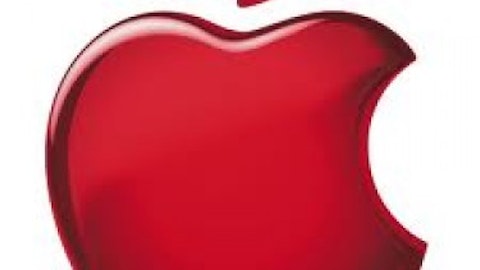At first glance, Apple Inc. (NASDAQ:AAPL)‘s iTunes Radio service didn’t quite fit the bill of being a “Pandora Media Inc (NYSE:P) killer.” The service itself is largely the same, offering users the chance to discover new music based on historical listening habits. iTunes Radio enjoys a pricing advantage, but the $11-per-year difference for paying subscribers isn’t breaking anyone’s wallet.

iTunes Radio. Source: Apple.
That being said, Apple Inc. (NASDAQ:AAPL)’s real threat to Pandora will come from within the music industry itself.
The Wall Street Journal has gotten its hands on some of the rates that Apple Inc. (NASDAQ:AAPL) is paying to independent record labels, which are similar to its terms with the major labels; the Mac maker is looking awfully generous next to its incumbent rival at a time when Pandora’s tensions with the record industry are at all-time highs.
For the first year, Apple Inc. (NASDAQ:AAPL) will pay 0.13 cents per song play, in addition to sharing 15% of net advertising revenue that’s proportionate to the record label’s share of music played on iTunes. Those figures jump to 0.14 cents per song play and a 19% ad share in the second year. In comparison, Pandora pays 0.12 cents per song played through its free service.
The real kickers
The rate per song isn’t dramatically different. Instead, the two things that investors should note is the ad share, as well as which way those rates are heading.
Apple Inc. (NASDAQ:AAPL)’s advertising business has always been for the benefit of content providers. iAd was launched as an additional way for developers to monetize their apps, and Apple is using a similar strategy here with iTunes Radio.
Sharing ad revenue is precisely something that Pandora Media Inc (NYSE:P) can’t do, since ads are its primary monetization strategy. Advertising revenue was 84% of total sales last quarter, and content acquisition costs (i.e., royalties) were 79% of advertising revenue.
| Pandora Income Statement Data | Q1 2013 |
|---|---|
| Advertising revenue | $105.1 million |
| Content acquisition costs | $82.9 million |
Source: 10-Q.
Pandora Media Inc (NYSE:P) remains unprofitable, and sharing ad revenue with labels would make its quest for black ink that much harder.
On top of that, Pandora Media Inc (NYSE:P) continues to seek ways to reduce the royalty rates it pays, which is a lot of why there’s so much hostility between it and the music industry right now. Just this month, it acquired small South Dakota terrestrial radio station KXMZ-FM in an effort to qualify for lower royalty rates. BMI, one of the organizations that represent artists, immediately sued Pandora Media Inc (NYSE:P) over the move, calling it a “stunt” to “artificially drive down its license fees.”
The episode is just beginning, but the point is that while Pandora Media Inc (NYSE:P) is trying to pay less, Apple Inc. (NASDAQ:AAPL) is willing to pay more. Whom would the record labels rather partner with?
Deja vu
The whole situation is reminiscent of Apple’s controversial entry into the e-book market, challenging Amazon.com, Inc. (NASDAQ:AMZN). Book publishers absolutely loathed the wholesale model that allowed Amazon to sell books at $9.99, since they felt that reduced consumer perception of a book’s value down to unsustainable levels. Amazon.com, Inc. (NASDAQ:AMZN)’s dominant 90% market share gave them little choice but to begrudgingly play ball.
When Apple came along and offered publishers the ability to set their own prices with the agency model, they jumped at the opportunity and Amazon.com, Inc. (NASDAQ:AMZN) had no choice but to follow suit. The net result was that e-book prices rose across the board, which has in turn led to a massive antitrust lawsuit against Apple that’s still under way.
That case is different in many ways, but the underlying storyline is that Apple is offering content providers a far more attractive deal than they have with incumbents, giving them leverage to negotiate better deals at the expense of those incumbents, either strategically or financially.
In the e-book case, Amazon even temporarily pulled Macmillan’s titles at the height of the dispute because Macmillan threatened to delay availability of new releases. Ironically, the broader shift to the agency model has probably boosted Amazon’s results, since it no longer sells titles at a loss and now grabs a 30% cut of higher prices.
Record labels could potentially give Pandora a similar ultimatum: “Pay us more, or we go with Apple.” If Pandora gives in, it may never reach profitability. If it doesn’t, the dominant music service may soon find itself with a lot less content. Apple probably won’t kill Pandora’s actual service anytime soon, but it could easily kill its prospects of ever posting black ink.
The article Apple Will Gut Pandora From the Inside Out originally appeared on Fool.com and is written by Evan Niu, CFA.
Fool contributor Evan Niu, CFA, owns shares of Apple. The Motley Fool recommends Amazon.com, Apple, and Pandora Media (NYSE:P) and owns shares of Amazon.com and Apple.
Copyright © 1995 – 2013 The Motley Fool, LLC. All rights reserved. The Motley Fool has a disclosure policy.






